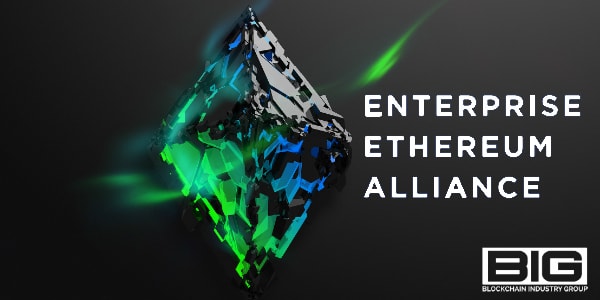
The Enterprise Ethereum Alliance (EEA) is the world’s largest open-source blockchain initiative with over 400 member companies. The alliance brings together leaders and innovators across many industry sectors, including various industry-leading companies, startups, and high-tech experts, for the purpose of advancing enterprise blockchain technology use and development of enterprise-grade applications.
The EEA international membership is a who’s who of major corporations, blockchain technology organizations, and Ethereum startups. Major corporate members include Accenture, British Petroleum, Credit Suisse, ING, Intel, JPMorgan, Microsoft, Shell Global, and UBS. Membership is very active and increases every month. EEA is visible and interactive at global conferences. The alliance also sponsors regular meetups.
The EEA aims to facilitate the mass adoption of Ethereum-based technology beyond what is possible through individual company and industry efforts. The EEA’s collaborative research and development initiatives cover areas that are critical to the maturing of blockchain technology industry applications. These areas include security, scalability, privacy, and confidentiality, all of which are necessary for blockchain to achieve its potential for complex corporate use on a global industry scale.
One of the strengths of this alliance is its working groups. The EEA’s working groups are member-driven, with a focus on current needs as well as opportunities for future growth. Members are encouraged to participate in existing working groups and to suggest new groups, especially based on identified industry needs.
Current industry working groups include Advertising, Banking, Communications Protocol, Healthcare, Insurance, Integration and Tools, Legal Industry, Quorum, Standards, Supply Chain, and Token. The most recently added working groups include Energy, Digital Identity, and Multiplatform Interoperability. No doubt more working groups will be created by EEA members in the near future.
Working groups focus on setting standards and best practices, addressing regulatory concerns, developing pain-point solutions, and creating partnership opportunities within each industry area. The scope of these groups is intended to mature the blockchain industry by working through standard discrepancies, considering immediate areas to develop, and modeling this technology’s widespread potential.
EEA aims to create industry standards for governance and accountability, models for enterprise applications and integration, as well as industry resources. The alliance is shaping up as a go-to resource for companies that want to learn how to leverage Ethereum blockchain for their specific business and industry needs.
By Janet Eriksson, BIG Writer



